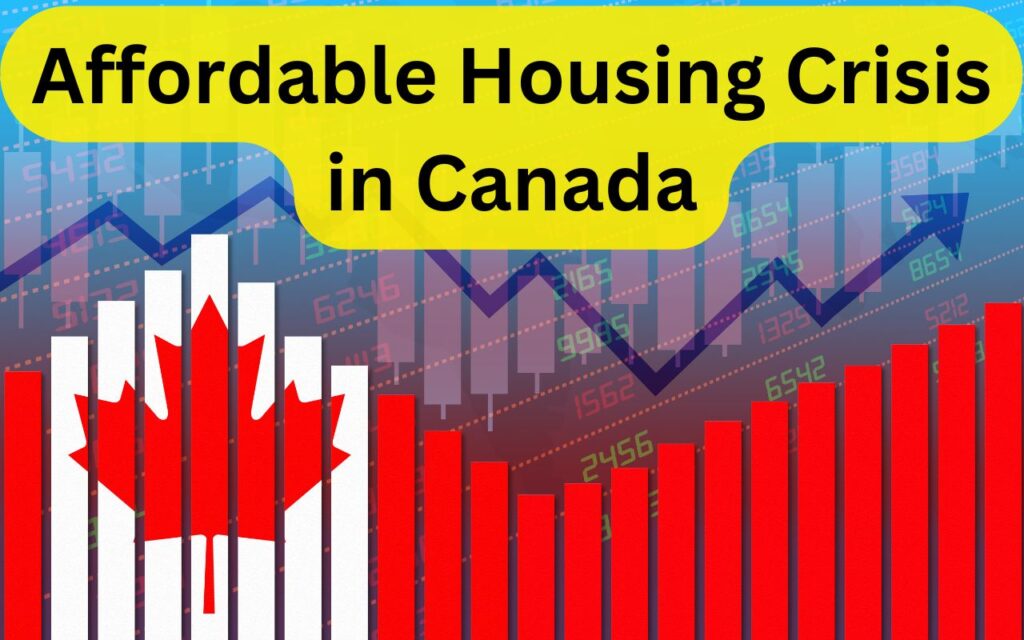The reasonable Housing Crisis in Canada has arrived at a basic point in 2024. With heightening housing costs in significant urban communities like Toronto, Vancouver, and Montreal homeownership and rental choices progressively blocked off for some Canadians.
The circumstance has been exacerbated by expansion, stale wages, and a developing populace, particularly in metropolitan places.
Urban communities the nation over are wrestling with how to make housing more reasonable for occupants while adjusting development and maintainability. State-run administrations at the government, provincial, and civil levels are sending off initiatives to battle increasing expenses. Yet numerous Canadians battle to track down steady and reasonable housing.
This article investigates the methodologies Canadian urban communities are taking to address the Housing Crisis. The difficulties confronted, and the expected effect on long-haul reasonableness.
Affordable Housing Crisis in Canada
Housing moderation is a developing worry in Canada. As of late, property costs have soared, making it challenging for some Canadians to purchase or lease homes.
| Title | Affordable Housing Crisis |
| Country | Canada |
| Category | Finance News |
A portion of the key elements driving up costs include:
- Appeal: Rapid populace development in metropolitan regions has expanded interest in housing.
- Supply Deficiencies: There needs to be more reasonable housing units, particularly in significant urban communities.
- Theory and Venture: Unfamiliar and homegrown financial backers purchasing properties have driven up costs.
- Expansion: Increasing expenses of materials, work, and land have expanded the cost of building new homes.
- Loan costs: Higher loan fees on contracts are pushing regularly scheduled installments past the scope of many.

These variables have brought about a housing market where costs are far off for low-and center income Canadians. The outcomes are serious: more individuals are leasing, however, rental costs are additionally taking off, leaving numerous in shaky housing circumstances.
How Cities Are Responding?
Different Canadian urban communities have embraced different techniques to address the reasonable Housing Crisis. Beneath, we investigate how urban communities like Toronto, Vancouver, and Montreal are attempting to handle rising housing costs in 2024.
1. Toronto’s Focus on Expanding Supply
Toronto is one of Canada’s most costly urban areas for housing. In 2024, Toronto introduced a few initiatives to support the stockpile of reasonable homes. The city’s HousingTO 2020-2030 arrangement expects to make 40,000 new reasonable rental units over the following 10 years.
This includes working with private engineers, non-benefits, and different accomplices to boost the development of reasonable homes.
Also, the city is zeroing in on drafting changes. This remembers permitting more multi-unit abodes for generally single-family neighborhoods. These progressions make it more straightforward to fabricate duplexes, trios, and apartment complexes, which can increment housing thickness and supply.
Toronto is likewise executing an opportunity charge. This assessment targets void homes claimed by financial backers who are not leasing them out. By punishing mortgage holders who leave their properties empty, the city desires to drive more homes into the rental market.
2. Vancouver’s Push for Affordable Rental Options
Like Toronto, Vancouver faces an outrageous Housing Crisis. Vancouver has one of the greatest property costs in Canada. To battle this, the city has embraced a progression of measures pointed toward expanding the accessibility of reasonable rentals.
One of the city’s most critical initiatives is the Moderate Income Rental Housing Pilot Program (MIRHPP). Under this program, designers are boosted to construct rental housing units focused on moderate-income families. These units should be leased at underneath market rates, making them more reasonable for working-class occupants.
Vancouver has additionally carried out momentary rental guidelines. By restricting the number of properties that can be leased on stages like Airbnb, the city is opening up more long-haul rental housing units.
Notwithstanding these initiatives, Vancouver is additionally working to increment land accessibility for reasonable housing. The city is redeveloping under-utilised public grounds to make serious housing, zeroing in on making blended-income areas that incorporate reasonable rental and proprietorship choices.
3. Montreal’s Commitment to Affordable Housing Programs
Montreal has likewise been wrestling with moderation issues as of late. Accordingly, the city has carried out a few programs pointed toward expanding reasonable housing choices for its occupants.
One of the key initiatives is the Montreal Reasonable Housing Strategy, which centers around making reasonable housing for low-and center income families. The strategy incorporates a blend of new development and the safeguarding of existing reasonable rental units.
Montreal has likewise presented inclusionary drafting strategies. Under these guidelines, engineers should save a level of new housing units for reasonable housing. This guarantees that new advancements are taking special care of the rich as well as incorporating choices for those with lower incomes.
Montreal is additionally putting vigorously in agreeable housing. These housing centers give reasonable housing choices overseen by the actual inhabitants, offering a greater community-situated way to deal with handling the Housing Crisis.
4. Calgary’s Innovative Approaches to Housing Affordability
Calgary, while not confronting a similar degree of emergency as Toronto or Vancouver, is likewise managing rising housing costs. The city has sent off a few initiatives to guarantee housing stays reasonable for its inhabitants.
The Calgary Reasonable Housing Strategy is centered around expanding the inventory of reasonable housing units. The city is working with non-benefits, private designers, and different partners to make a blend of rental and proprietorship open doors for low-center-income families.
One of Calgary’s most imaginative programs is the Feasible Homes Calgary Corporation. This non-benefit association offers homeownership open doors to people and families who could somehow or another be overestimated. The program gives initial installment help and reasonable home loan choices, assisting more Calgarians with becoming mortgage holders.
5. Edmonton’s Focus on Homelessness and Low-Income Housing
Edmonton is adopting a two-dimensional strategy for handling the Housing Crisis: tending to vagrancy and expanding the inventory of low-income housing.
The city’s EndPovertyEdmonton strategy remembers a concentration for housing as a vital way to calculate decreasing neediness. Edmonton is putting resources into strong housing for destitute people and those in danger of vagrancy. These housing units accompany work in help administrations, for example, psychological well-being and fixation administrations, to assist occupants with changing out of vagrancy.
Edmonton has likewise dedicated itself to building reasonable rental units. The city’s reasonable housing plan incorporates both new development and the protection of existing low-income housing units. The objective is to guarantee that Edmonton’s most weak occupants approach protected and reasonable housing.
6. Ottawa’s Collaboration With Nonprofits and Government Agencies
Ottawa is another Canadian city wrestling with high housing costs. To resolve this issue, the city has cooperated with non-benefits, government offices, and private areas to foster reasonable housing arrangements.
One of the city’s key initiatives is the Ottawa Community Housing Corporation (OCH). OCH gives reasonable housing choices to more than 32,000 inhabitants, including low-income families, seniors, and people with handicaps.
The city is likewise working on blended-use advancements, where reasonable housing units are joined with retail and business spaces, making energetic networks with admittance to fundamental administrations.
Ottawa is likewise investigating public-private partnerships (P3s) to fund new reasonable housing improvements. These partnerships permit the city to use private area speculation to make more reasonable housing choices for its occupants.
7. Halifax’s Approach to Preserving Affordable Housing Stock
Halifax is confronting a developing housing moderation emergency, especially as additional individuals move to the city. Accordingly, the city has carried out a few procedures to safeguard and build its reasonable housing stock.
Halifax has introduced lease control measures with a limit on how much property managers can increment leases every year. This is planned to forestall abrupt and sensational lease climbs, which can push occupants out of their homes.
The city is likewise zeroing in on redeveloping underused public land for reasonable housing. By working with non-benefits and community associations, Halifax is making reasonable housing projects that serve low-and center income occupants.
Conclusion
The reasonable Housing Crisis in Canada is a mind-boggling issue with no simple arrangements. Nonetheless, urban communities the nation over are making a move. By expanding the stockpile of reasonable homes, and transforming drafting regulations. And carrying out strong housing programs, in urban communities like Toronto, and Vancouver.
| Homepage | uhmychart.org |
Montreal is working to guarantee that all Canadians approach protected and reasonable housing. It proceeded with exertion and cooperation between state-run administrations, private engineers, and non-benefits. Canada can gain a huge headway in handling this basic issue in 2024 and then some.
FAQs About Affordable Housing Crisis in Canada
What are the main factors contributing to the affordable Housing Crisis in Canadian cities?
Rising demand, limited housing supply, increasing construction costs, and investor-driven property purchases are the primary drivers of the crisis.
How are Canadian cities addressing the housing affordability issue?
Cities are implementing policies like rent control, expanding affordable housing projects, and offering incentives for developers to build more affordable units.
What role does the federal government play in tackling the Housing Crisis?
The federal government provides funding for affordable housing initiatives, such as the National Housing Strategy, and offers tax credits to encourage development.
Are rent control measures effective in reducing housing costs?
Rent control helps stabilize rent prices for tenants, but it may also reduce incentives for developers to build new rental properties, leading to supply shortages.
What other solutions are being considered to combat the Housing Crisis?
Zoning reforms, increasing density in urban areas, promoting modular and prefabricated housing, and expanding public transit are key strategies being explored.
PV Martinez holds an MBA in Finance from the University of Michigan. When not analyzing numbers, PV enjoys playing football and spending time singing his favorite tunes.





